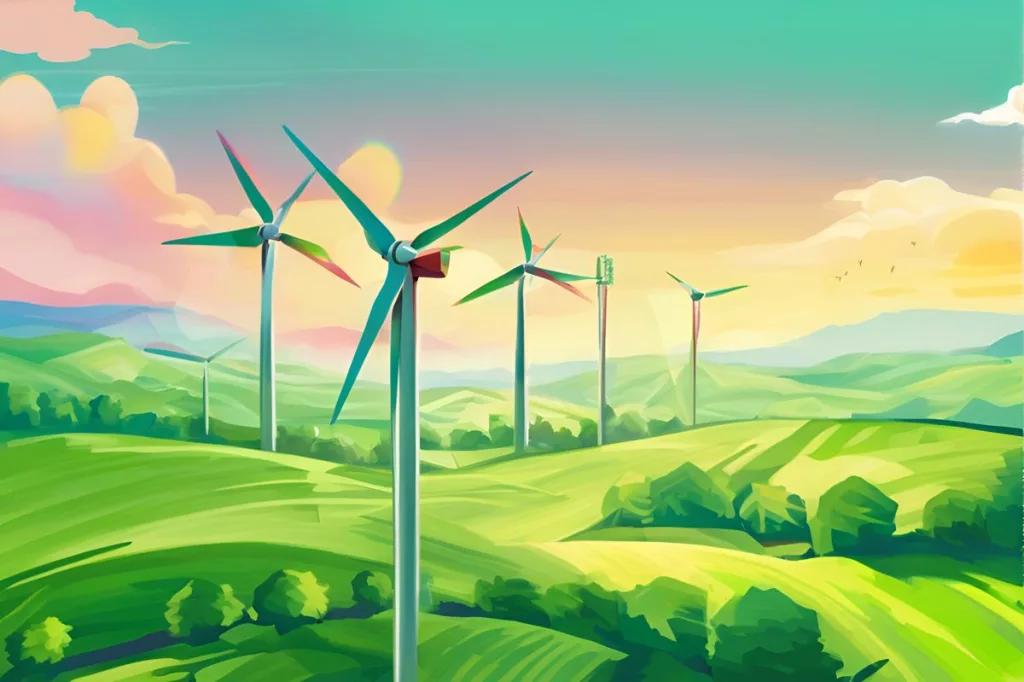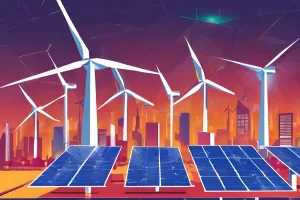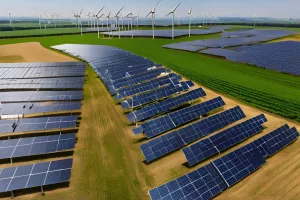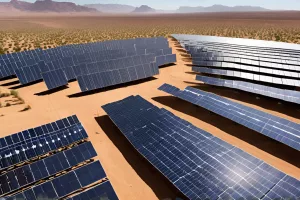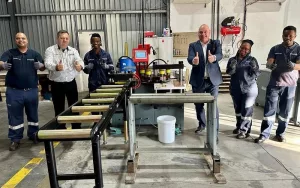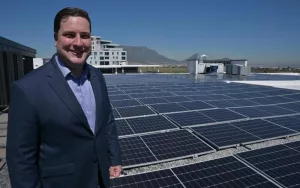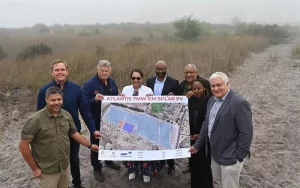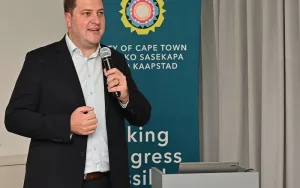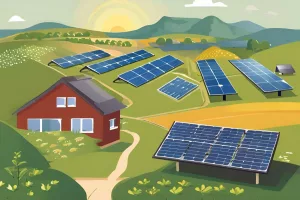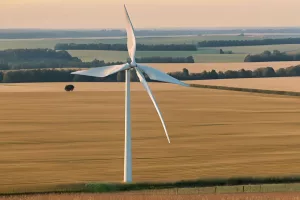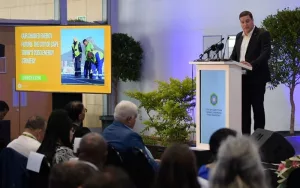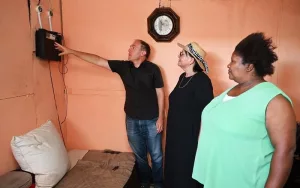South Africa is stepping boldly into a bright future powered by renewable energy. At a recent seminar in Johannesburg, Deputy Minister Samantha GrahamMaré shared a message of hope as she addressed plans to boost energy and create jobs through partnerships with Independent Power Producers. With over 12 gigawatts of renewable energy on the horizon, the nation is overcoming challenges like power outages and fostering economic growth. The event marked a significant moment in the country’s journey, highlighting the collaboration needed to unlock a sustainable and prosperous energy landscape. South Africa is ready to embrace a new dawn in energy innovation!
South Africa is dreaming big for its energy future, aiming for more reliable power, economic growth, and new jobs. At a lively seminar in Johannesburg, Deputy Minister Samantha GrahamMaré shared this exciting vision, emphasizing teamwork and the use of various energy sources like gas. With over 7GW of renewable energy already in place and more on the way, the country is ready to break free from power outages and create a brighter, greener tomorrow. This journey is a collective effort, filled with hope and determination to make South Africa a leader in renewable energy.
Climate change is a real and urgent crisis that poses physical and transitionrelated threats to South Africa. The country is vulnerable due to its increased warming rate, which results in droughts, fierce storms, and rising sea levels that endanger its food and water supply, infrastructure, and the health of its inhabitants and wildlife. However, the transition process could provide opportunities for voluntary decarbonization and significant “climate returns” for investors. To ensure fairness and equity, comprehensive changes in policy, law, technology, and market are required, and addressing social risks, particularly potential job losses, is fundamental.
V&A Waterfront in South Africa is embracing renewable energy by aiming to use 70% of it in five years through a power purchase agreement with Etana Energy. The company also plans to install rooftop solar panels to increase renewable energy to almost 80%. The goal is to be netzero carbon emissions by 2035, with significant progress already made in reducing carbon emissions, water usage, and waste. The waterfront’s sustainability strategy involves everyone, including tenants, residents, staff, and visitors, and serves as an example for others to follow.
Modulêr Electrical Assemblies, located in the Atlantis Special Economic Zone, produces electrical panel components that play a crucial role in the shift towards renewable energy. Its growth is a testament to the potential of renewable energy as a driver of job creation and economic growth. The ASEZ provides an ideal environment for business growth in the renewable energy and agribusiness value chains, with various development programs in place to promote economic development. The future of Atlantis is set to become a shining example of green innovation and sustainable industrial growth.
Eskom, South Africa’s national power corporation, has achieved a significant improvement in energy availability, with an Energy Availability Factor (EAF) of 70.78%, ending nearly three years of struggle with power supply. This progress is credited to the initiatives implemented by the current Eskom board, including solidifying the management team, implementing performancebased incentive bonuses, and identifying critical power stations requiring immediate attention. Eskom’s dependence on Open Cycle Gas Turbines (OCGTs) has also lessened due to the improved performance of its coal fleet, resulting in lower diesel usage and greater efficiency. The contribution of businesses and renewable energy sources also signals a hopeful outlook for the future of South Africa’s energy sector.
Cape Town’s innovative “Cash for Power” program incentivizes solar power generation by buying leftover solar PV power from smallscale producers and providing rewards, making it an attractive opportunity for property owners. The program’s success is evident with over 1,500 power sellers earning over R30.8m. The city’s vision is to acquire as much solar power as households and businesses can generate, promoting sustainable energy solutions and a green economy. The application process has been streamlined with a new online portal and a bidirectional meter is set to be introduced.
Cape Town is taking a bold step towards energy sustainability with its flagship Atlantis Solar PV plant. The 7 MW solar facility, owned and managed by the city, is set to begin construction in August 2024 and will be a beacon of green energy. The Lesedi Technoserve Consortium is handling the project’s engineering, procurement, and construction, and the plant is expected to directly supply the city’s electrical network with the 7 MW of electricity it generates. This largescale renewable energy endeavor is also expected to promote job creation and contribute towards Cape Town’s netzero carbon emissions goal.
Cape Town is leading the way in renewable energy with its pioneering Energy Services Applications platform, which streamlines the application process for solar PV systems and significantly reduces the waiting period for authorisation. The city is committed to promoting solar power investment and reducing reliance on Eskom, while also ensuring the safety and integrity of solar PV systems. Residents and businesses can easily join the renewable energy revolution through the userfriendly online portal, which also offers incentives such as the Cash for Power programme.
South Africa is making significant progress in its energy transition, with a focus on addressing issues such as climate change, energy security, and energy poverty. The Integrated Resource Plan (IRP) outlines a diverse energy portfolio aimed at catering to the country’s escalating power demands while drastically cutting down carbon emissions. South Africa is making efforts to overcome obstacles, such as limited grid capacity, the inconsistent nature of renewable energy, and outdated infrastructure. The ultimate goal is to ensure that “we leave no one behind,” and South Africa’s experience can serve as an example for other African nations.
Cape Town is leading the way towards a sustainable future by adopting green energy through various projects such as embedded generation, solar, and energy utility reform. The city has secured global technical support from the Deutsche Gesellschaft für Internationale Zusammenarbeit (GIZ) and the German Development Bank (KfW) to fasttrack these projects. Cape Town’s commitment to diversifying its energy sources is witnessing steady advancement and is setting a global standard for the adoption of renewable energy.
Premier Mxolisi Dukwana of South Africa’s Free State Province outlined an ambitious economic plan focusing on innovation, strategic investment in infrastructure, and job creation. He emphasized the province’s unique advantages in renewable energy, mining, and agriculture, and its potential to shape the future economy. Dukwana committed to ethical governance and a united front towards prosperity, calling for investments in people and technologies to position the Free State among the economies of the future.
Cape Town’s Cash for Power programme allows residents and businesses to sell surplus solar PV power to the city, earning a combination of bill credits and cash payouts. The programme has already facilitated the purchase of 25 million kilowatthours of solar power from microgenerators and aligns with the city’s objective to eliminate loadshedding. Mayor HillLewis emphasises the importance of collective efforts in shifting towards a greener future and lauds the programme’s worth. The programme is expanding to include more residents and aims to diversify the city’s energy supply with independent power supply.
Cape Town has introduced an innovative energy strategy that enables residents to sell their excess solar power back to the city through the ‘Cash for Power’ program, which pays them in cash rather than crediting their municipal bills. The city aims to end loadshedding, stimulate job creation and economic growth, and provide free basic alternative energy to nongrid connected households, while residents can also join the ‘Power Heroes’ program by turning off their water heaters during peak hours. Cape Town’s Mayor, Geordin HillLewis, stated that Cape Town is now the pioneer city with an officially adopted Energy Strategy that aims to terminate loadshedding and stimulate job creation and economic growth.
Cape Town is leading the way in renewable energy solutions to improve living conditions in informal settlements. The Urban Energy Poverty Programme is collaborating with community partners to develop affordable, sustainable energy solutions such as indoor solar lights, renewable public lighting, and smart cookers. Education and awareness campaigns are promoting the advantages of alternative energy sources, while ongoing research and technological developments are advancing the programme’s goals. The City is committed to creating a brighter, cleaner, and safer future for its inhabitants.
Cape Town’s innovative energy initiatives have gained global recognition, including a recent visit by the World Bank’s Vice President for Eastern and Southern Africa to the Steenbras Hydro Pumped Storage Scheme. With plans to boost loadshedding protection and substantial infrastructure investment, the city is setting out on a tenyear journey to create the “City of Hope”. The city’s power supply diversification initiatives include LPUs curtailment, Embedded IPP renewable energy, and a Dispatchable IPP Programme, among others. The World Bank has extended invaluable support to Cape Town, providing pinpointed technical assistance to several departments, including Energy, Future Planning and Resilience, and Water and Sanitation.

